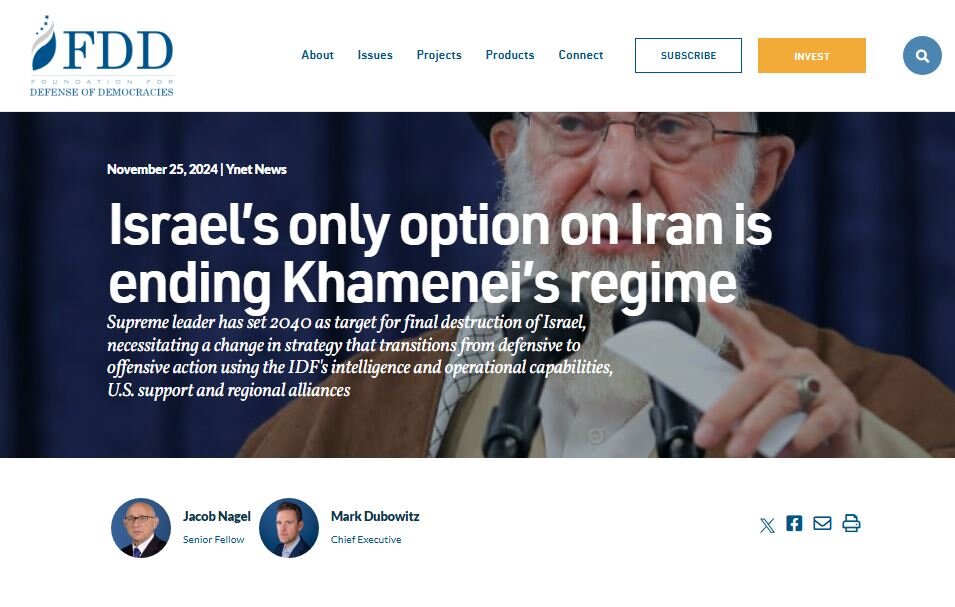Irans defensive military doctrine encouraging friends sowing fear amongst enemies
Iran’s defensive military doctrine: encouraging friends, sowing fear amongst enemies
TEHRAN – Iran’s post-revolution military strategy has focused on two key pillars: strengthening its indigenous defense capabilities and supporting like-minded actors challenging Western imperialism.

The development of missile and drone technology, fueled by sanctions restricting arms imports, reflects the former. The latter is evident in Tehran's backing of the "Axis of Resistance," a network sometimes referred to as "forward defense" by Western analysts.
Jacob Nagel and Mark Dubowitz, writing for the Foundation for Defense of Democracies (FDD), a Washington think tank with a pro-Israel policy and alleged involvement in assisting the U.S. with anti-Iran sanctions, have published an article outlining methods to “defeat” Iran.
The article has a clear bias toward Israel and fails to address facts on the ground. The core idea of the piece is based on advice to Israel to shift its supposed policy of “survival” to an offensive one. The article frames Israel’s genocidal actions in West Asia as “self-defense” and urges even more violence from the regime. Israel’s war on Gaza and Lebanon has claimed tens of thousands of lives. Yet, the article echoes Israeli claims that the Resistance Axis is responsible for the devastating situation in the region.
The reality is this: since Israel's creation in 1948, a pattern of land grabs, oppression, and killings has persisted. The current situation was not shaped in a vacuum. Nagel and Dubowitz celebrate Israel's supposed victories against Hezbollah, Hamas, and other Resistance groups, yet these groups remain active.
Hezbollah has maintained its military capabilities despite the assassination of late leader Sayyed Hassan Nasrallah and other top Lebanese commanders. The group continued to target deep inside occupied Palestine until the last moments before a ceasefire came into effect on Wednesday, and its military arsenal remains largely intact.
In the Gaza front, Israel has no “day after” plan, and occupying the territory and building settlements is not a viable option for Tel Aviv due to several reasons including global pressure. Also appointing the Palestinian Authority as a governing body for Gaza is not practical. The Palestinian Authority lacks popular support and is unlikely to be able to govern Gaza without Hamas's involvement.
The article backs the idea of attacking Iranian nuclear sites as the newly elected president of the U.S. strongly supports Israel. Despite the questionable capability of Israel to destroy Iranian sites, any attack on these facilities will completely wipe out the possibility of diplomacy in this field. Possible attacks coupled with more economic pressure on Iran will only hasten the process of militarization of the country’s nuclear program. As seen over the years, more economic pressure on Iran will only raise the levels of uranium enrichment in the country keeping it away from the negotiating table.
Also, U.S. direct involvement in any anti-Iran strike will make Washington’s military bases and personnel in the region a legitimate target. Regional countries as seen in the Iranian retaliation against Israel are trying their best to skirt the Tehran-Tel Aviv confrontation. Iran has chosen the path of diplomacy with its Arab neighbors mainly Saudi Arabia through China’s mediation.
It seems that the Kingdom of Saudi Arabia, in its modernization drive, has incorporated an assessment of the risks associated with potential conflict with Iran and its allies, including the targeting of Saudi oil infrastructure. This approach towards de-escalation appears to be emulated by other Persian Gulf states.
China, meanwhile, appears to be pursuing not only economic objectives in the region but also aims to provide an alternative to U.S. influence in West Asia. Furthermore, any major crisis will disrupt oil exports from the region, a factor which more than any other global actor affects China.
The authors then propose targeting Iranian nuclear scientists and military officials, a tactic employed by the U.S. and Israel in the past decades with very limited success. Despite such assassinations, Iran quickly replaced personnel, and its nuclear program and broader confrontation with the West continued unabated.
One of the major remedies that the authors offer Israel in the face of Iran is support for anti-Tehran groups including terrorists, separatists, and foreign-based opposition groups. Nagel and Dubowitz urge Western nations to support “Iranian people” in facing the state. However, since the Islamic Revolution in Iran, the U.S. and its allies have been supporting these groups but to no avail.
In recent years several protests have taken place in Iran with direct and indirect support of the collective West. However, none have resulted in the West’s desired “regime change”. That’s because the groups Western countries are continuously backing have no credibility among Iranian citizens due to direct allegiance to global powers. The “maximum pressure” policy on Tehran by the states who want to stand with the “people of Iran” has also failed to push citizens to confront the government. All the prescriptions in the article have been tested and repeatedly failed in recent decades.
source: tehrantimes.com